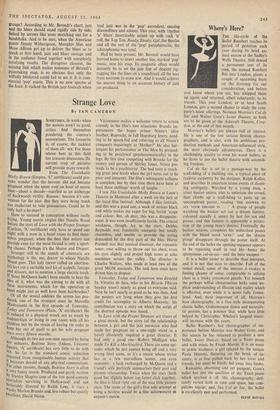Strange Love
By IAN CAMERON
SOMETIMES, in weeks when the movies aren't so good, critics find themselves pondering the cinema's conventions. The favourite is, of course, the tackiest of them all: sex. For those whose bent in this field lies towards discussion, the current crop of pictures will provide many rewards.
Even The Unsinkable Molly Brown (Empire, 'U' certificate) could pro- voke wonder that the heroine did not become Pregnant when she spent over an hour of movie time--about a decade—married to an archetype of backwoods virility. Reason: because it's con- venient for the plot. But they were being much too exuberant to take precautions. Could he be only half a he-man?
How to' succeed in conception without really trying. Young movie virgins like Natalie Wood before the start of Love with the Proper Stranger (Carlton, 'X' certificate) only have to spend one night with a man in a hotel room to find them- selves pregnant, when the best that nature can Provide even for the most fecund is only a sport- ing chance. Perhaps it's the Shame and Disgust.
Stranger still in the annals of cinematic sex mythology is the, um, doctor to whom Natalie Wood goes. This lady (never called an abortion- ist) lays out a veritable tool kit of scalpels, forceps and scissors, not to mention a large electric torch. If Steve McQueen hadn't been unable to bear the idea of it, what was she aiming to do 'with all these instruments, which for the operation' in band might just as well have been hairbrushes?
Of all the sexual oddities the screen• has pro- duced, one of the strangest must be , Marcella Mastroianni in the first episode of Yesterday, 7'oday and Tomorrow (Plaza, 'X' certificate). He is reduced to a physical wreck not so much by Malnutrition or living in one room with all his Children but by the strain of having (in order to keep her out of gaol) to get his wife pregnant once every fifteen months.
Although its two ace con-men succeed by being ,ace seducers, Bedtime Story (Odeon, Leicester Square, 'A' certificate) has very little to do with Sex. So far is the standard comic seduction removed from recognisable, human activity that it becomes devoid of any physical connotations. For other reasons, though, Bedtime Story is often a very funny movie. Produced and partly written by Stanley Shapiro (one of the few good comedy specialists surviving in Hollywood) and not 'noticeably directed by Ralph Levy, it' stars a wacky Marlon Brando and, less robust but quietly excellent, David Niven.
Viciousness makes a welcome return to screen comedy in the film's best situations. Brando im- personates the bogus prince Niven's idiot brother, Ruprecht, in full Hapsburg finery, need- ing to be spoon-fed and referring to all Niven's conquests inquiringly as 'Mother?' He also bur- lesques his performance in The Men by pretend- ing to be paralysed (psychosomatically) in the legs. By this time competing with Brando for the money and person of Shirley Jones, Niven pre- tends to be a psychiatrist. The bad taste is reach- ing great new levels when the girl turns out to be poor and innocent. The film's subsequent collapse is complete, but by that time there have been at least three shillings' worth of laughs.
I saw The Unsinkable Molly Brown at -Loew's Theatre in Montreal after a week on the jury of the local film festival. Although. I like festivals, and this was a good one, a week of serious black and white makes me eager for big, lavish 'scope and colour. But, oh dear, this was a disappoint- ment. It was even insufficiently lavish. The crucial weakness, though, lay in the stars. Debbie Reynolds was frantically energetic but totally charmless, and unable to provide the acting demanded by the first part of the film. Harve Presnell was that musical dinosaur, the romantic tenor, ever willing to throw out his chest, cross his eyes slightly and propel high notes at echo
• machines across the valley. The director is Charles Walters, who made at least two of the great MGM musicals. The task here must have driven him to despair.
• Yesterday, Today and Tomorrow was directed by Vittorio de Sica, who in his. Bicycle Thieves heyday wasn't nearly as good as everyone said. Now he isn't nearly as good as he was then. And the posters are lying when they give the first credit for screenplay to Alberto Moravia: his contribution was a story on which the script of the shortest episode was based.
In Love with the Proper Stranger are traces of a 'great movie, but the story (of the relationship between a girl and the jazz musician who had made her pregnant on a one-night stand in a hotel) absolutely required a great director. It had only a good one—Robert Mulligan who made To Kill a Mockingbird. There are some epi- sodes which he just cannot bring off and a very wrong final scene, so it's a movie whose virtue lies in a few marvellous scenes, and even moments: a look exchanged by McQueen and a friend's wife perfectly summarises their past and present relationship. Twice when the stars (both good but slightly below top form) click together, the film is lifted right out of the nice little picture class. The scene of the girl's first solo attempt at being a hostess would be a fine achievement in anyone's movie.


































 Previous page
Previous page